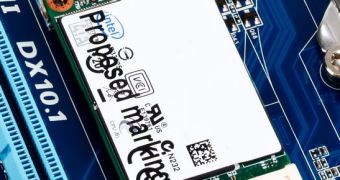One might not immediately assume this to be a very likely occurrence, but it looks like Gigabyte decided to incorporate a certain interface usually found in light mobile computing devices into one of its upcoming mainboards.
There are certain design innovations that instantly grab attention, often because they deliver a significant improvement to the existing feature set or a much needed new capability.
Then, there are those smaller tweaks or additions that, at first glance, might not seem all that relevant.
What Gigabyte did to a certain, upcoming Z68 motherboard apparently falls into the second category, but it might be something that rival companies will emulate.
The platform itself wasn't really detailed, so the only things known about it are what one can gleam from the small photo that was put on Facebook.
Said picture shown an mSATA chip, which is a processor meant to act as a mini PCI Express connector, only with the SATA interface instead of PCIe or USB.
The technology was originally invented for tablets and thin laptops, so as to allow for the integration of standardized, small solid state drives.
In other words, the mSATA is responsible for how some of the slates and laptops out there have not so modest capacities of NAND Flash storage.
One might not expect this chip to land on a desktop motherboard, but this is exactly what Gigabyte did, having placed it between the CPU socket and the visible PCI Express slot.
Considering the fact that the PCB is blue, as the folks over at VR-Zone realized, this may very well be a low-end platform, what with recent high-end models featuring black PCBs.
Still, there is also the possibility that this is just a prototype and that the final iteration, if high-end, will be given that black coating.
Regardless, it will take an official announcement, or at least another leak, to actually shed any sort of light on all this.
UPDATE: Gigabyte has now revealed that four boards, named Z68XP-UD3, Z68XP-D3, Z68AP-D3 and Z68P-DS3, will have mSATA, all of them fairly low-end ATX models. Computex may bring more news.

 14 DAY TRIAL //
14 DAY TRIAL //